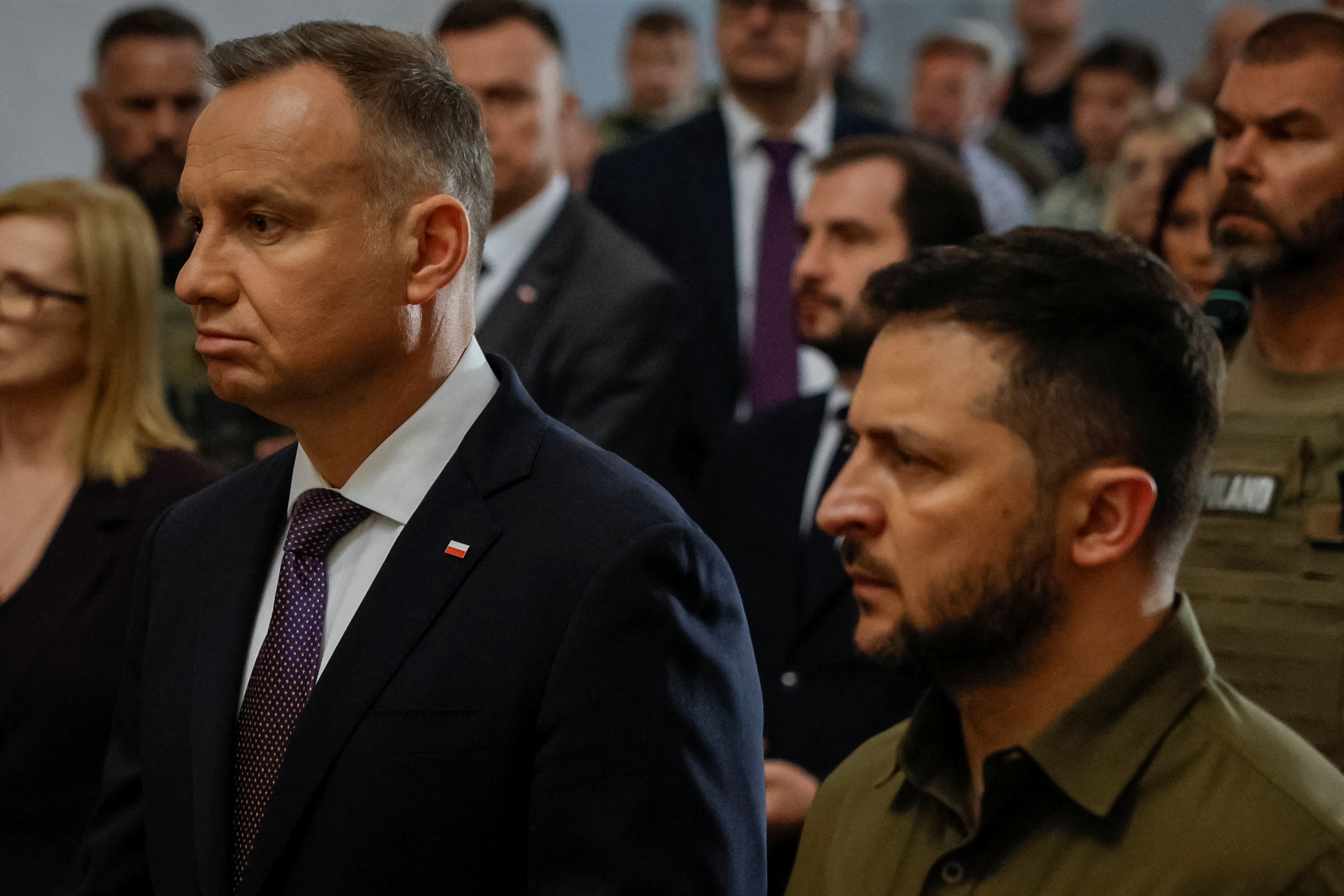/cloudfront-us-east-2.images.arcpublishing.com/reuters/MI7FQ4TVTVMNBOQ5UVOANR4NIM.jpg)

Ukrainian President Volodymyr Zelensky and Polish President Andrzej Duda commemorate World War II victims at the Cathedral of Saint Peter and Paul, amid Russia’s attack on Ukraine, in Lutsk, Ukraine on July 9, 2023. REUTERS/Alena Smutko/File Photo Obtaining licensing rights
WARSAW (Reuters) – Poland’s prime minister asked Ukrainian President Volodymyr Zelensky on Friday not to “insult” Poles, continuing his harsh tone towards Kiev after the Polish leader sought to defuse a simmering row over grain imports.
Poland decided last week to extend the ban on Ukrainian grain imports, which shook Kiev’s relationship with its neighbor, which is considered one of its strongest allies since Russia invaded Ukraine in February last year.
Zelensky angered his neighbors when he told the UN General Assembly in New York that Kiev was working to preserve land routes for grain exports, but that “political theater” around grain imports only helped Moscow.
“I want… to tell President Zelenskiy never to insult Poles again, as he recently did during his speech at the United Nations,” Prime Minister Mateusz Morawiecki told a campaign rally.
Poland holds parliamentary elections on October 15, and Morawiecki’s ruling nationalist Law and Justice Party has come under criticism from the far right for what it says is the government’s submissive stance toward Ukraine.
Analysts say this has forced PiS, which looks set to remain the largest party but may not secure a majority, to adopt a more confrontational approach towards Kiev in the close election campaign.
Earlier on Friday, President Andrzej Duda, an ally of PiS, said the dispute between Poland and Ukraine over grain imports would not significantly affect good bilateral relations, in an apparent move to ease tensions.
“I have no doubt that the dispute over the supply of grain from Ukraine to the Polish market is an absolute part of the entire Polish-Ukrainian relations,” Duda said at a business conference.
“I don’t think it can have much impact on them, so we need to resolve this matter between us.”
Support Ukraine
Meanwhile, Polish Foreign Minister Zbigniew Rau, writing for Politico, said Poland wanted to see “a strong Ukrainian state emerge from this war with a vibrant economy” and that Warsaw “will continue to support Ukraine’s efforts to join NATO and the European Union.”
“There is absolutely no contradiction here.” Rao wrote. “Supporting Ukraine against the Russian invasion, protecting our citizens and protecting them from unfair economic competition – both serve Poland’s interest at the same time.”
However, speaking to reporters in New York, Rao said that although Poland had not changed its policy towards Ukraine, there had been a “radical change in Polish public opinion’s perception” of relations between the two countries.
In response to a question by the official PAP news agency about what would be needed to improve this perception, Rao said fixing the atmosphere would require a “huge” diplomatic effort.
Slovakia, Poland and Hungary imposed national restrictions on Ukrainian grain imports after the EU executive decided not to extend the ban on imports to those countries and fellow EU members Bulgaria and Romania.
These countries say cheap Ukrainian agricultural goods – mainly intended to transit west and to ports – are sold domestically, hurting their farmers.
The European Union, which imposed the ban in May, allowed it to end on Friday after Ukraine pledged to tighten controls.
Morawiecki said on Friday that Warsaw would take matters into its own hands again if it deemed it necessary.
“If other markets are destabilized… and the European Commission does not act, we will once again take unilateral action on our part,” he said. “In defense of the Polish farmer, I would never hesitate to make such a decision.”
(Reporting by Alan Sharlich and Pawel Florkiewicz – Prepared by Mohammed for the Arabic Bulletin) Editing by Alex Richardson, Jonathan Oatis and Gareth Jones
Our standards: Thomson Reuters Trust Principles.

“Travel specialist. Typical social media scholar. Friend of animals everywhere. Freelance zombie ninja. Twitter buff.”





More Stories
Taiwan is preparing to face strong Typhoon Kung-ri
Israel orders residents of Baalbek, eastern Lebanon, to evacuate
Zelensky: North Korean forces are pushing the war with Russia “beyond the borders”